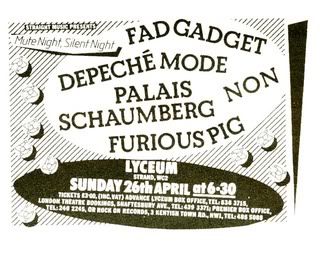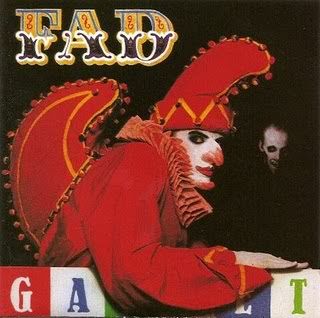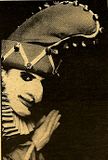The following month, April 1981, then saw Fad Gadget headlining a Mute Records night at London’s Lyceum Theatre, NON and Depeche Mode, who had recently released their debut single ( “Dreaming of Me”) also appearing on the bill. With D.A.F. having just left the label to sign with Virgin and The Normal, The Silicon Teens and Robert Rental not really being viable live acts, non-Mute bands Palais Schaumburg and Furious Pig also played that night in order to pad-out the bill. An NME review of the gig summarised Fad Gadget’s performance thus: ““..the group line-up with two drummers, one of them synthesized, plus guitar and keyboards; musically they represent electronic music’s hooligan element.”


The summer of 1981 also saw Fad Gadget making plans to tour America for the first time, as well as the release of a joint flexidisc, coupling “King of the Flies”, from his forthcoming second album, with an early version of “I Sometimes Wish I Was Dead” by Depeche Mode. This was then given away in huge quantities with Issue 11 of “Flexipop” magazine. An interview with Akiko Hada in ZigZag magazine also gave clues to the sound which would be heard on the forthcoming album – “’I think I’ll be using a lot more voice in the future. Experimenting with mixing-in the voice.’ Frank’s been listening to ‘Carmina Burana’ by Carl Orff, a classical piece of (mainly) choir written in the 1930s” – as well as the news that he was working on a collaboration with Boyd Rice, “to be released on Mute later this year”. As it happened, “Easy Listening for the Hard of Hearing”, as it was titled, did not see the light of day until 1984 – see later on for details.
1981 was also the summer of riots in a number of Britain’s larger cities, and this sense of unease and violence, along with the more varied approach mentioned above, are highly evident on the follow-up to “Fireside Favourites” which was released that Autumn. The title of the album (“Incontinent”) was apparently a pun, referencing the international travel that the band had enjoyed for the first time over the preceding twelve months. However, when one listens to the skittering, splattering instrumental title track, which closes the first side, a parallel scatological intention must be assumed. Tracks such as “Innocent Bystander”, with its muffled police sirens, and “Plain Clothes”, with lyrics of police brutality ( “Plain Clothes, they’ll arrest you again. Beat you up on the street, fight back and you’ll get the blame. They mix with the crowd in civilian dress. Just put one foot wrong, they’ll make you confess the rest”) certainly convey the sense of social unease prevalent at the time and, in this respect, the album evokes this aspect of the period as vividly as “Ghost Town” by The Specials which had topped the charts a few months earlier. Elsewhere, “Blind Eyes” and Swallow It” picked up the theme more obliquely, expressing Tovey’s dissatisfaction with the nation’s apathy in such bleak times, through a critique of the average man in the street’s passive acceptance of what was being presented to him – “Waste your money on some fad gadget, a multi toy for the family. Let’s all play at being concerned. It doesn’t really make much difference to me...blind eyes turning. Hear no, see no, speak no evil” and “Swallow it, like the fool you are, swallow it” are amongst the albums most memorable lyrics.

Choral, almost medieval sounding, backing vocals by Barbara Frost and Anne Clift also feature strongly in the mix and Fad Gadget, alongside the usual vocals, synthesizer and sequencer, is also credited with playing less conventional electropop instruments, such as Chinese shawm, saxophone and flute, whilst Nick Cash adds Jew’s harp and accordion to his percussive contribution. Robert Gotobed, who was coming to the end of his stint with the band, is also credited with playing drums on “Manual Dexterity”, a highly rhythmic instrumental, the title of which is self-explanatory. In terms of its musicality, the album is a long way from its predecessor, although the signature is still notably that of Frank Tovey/Fad Gadget. It was also warmly received in some areas of the press. Fred Dellar in “Smash Hits”, for example, wrote “Fad supplies synth sounds that induce you to listen while his percussive exploits dig you in the ribs in a manner you’ll enjoy. And though his songs are mainly about folk you won’t like – ghouls who hang around at the scene of an accident, well-to-dos who ignore the plight of the world’s poor and those who nearly work their way down to gutter level – Fad fashions them in a manner that will keep you hanging on. Can a man with a deadpan voice make one of the year’s most diverting albums? Seems so.”
For the record’s sleeve, as well as those of the two singles lifted from it, Tovey was dressed as seaside favourite Mr. Punch, the violence and brutality inherent in this character being a perfect metaphor for the album’s expression of the times. In a brief interview snippet featured in “Smash Hits” in the month of the album’s release, he explained his intentions for so dressing : “Fad wants to look like Punch (that seaside staple who knocks the living daylights out of a certain Judy because of all ‘the contradictions’ that the puppet represents. ‘Punch might make us laugh,’ Fad argues, ‘but he’s also ‘gruesome, sexist, racist and he beats up policemen. He’s everything you try and teach children not to be!’” In the Paul Morley interview, which I keep quoting, he elaborated further: “My mother could not tear me away from the Punch and Judy show. I could watch, enrapt, for whole days. The spectacle of the Punch and Judy show held me there, as if stupefied, through the sight of these puppets that talked, moved, clubbed each other. It was the spectacle of the world itself, which was unusual, improbable, but truer than truth which then presented itself to me in an infinitely simplified and caricatured form, as if to underline its grotesque and brutal truth.” It was certainly an extremely striking image which became synonymous with Fad Gadget for the months which followed, appearing regularly in the music papers alongside news of whatever he was doing during the period
To promote the album, Fad Gadget then embarked on a national tour supporting Toyah, who was then riding the crest of her popularity, although her audience were none too impressed with the less obvious presentation of the opening act when compared to the palatable pop star they’d paid to see. In a “Smash Hits” interview from early ‘82, Tovey gave an account of his poor reception: “Everybody would be screaming for Toyah while we were on...In England it was okay but in Ireland it got really violent, with people throwing chairs and coins and spitting all over us. In Ulster I jumped into the audience and got beaten up by the crowd. They ripped my shirt and I later crawled out with just one shoe on.” This, however, didn’t stop the diminutive punkette voting Fad Gadget to be her favourite artist of the year in the “Smash Hits” readers’ poll which closed 1981.
Expectations were riding high as 1982 dawned, with the increased exposure Fad Gadget had enjoyed as a result of press coverage and the Toyah tour – not everybody hated him, going on the evidence of a girl at my school who returned from the Manchester Apollo show on 21st December 1981 with a copy of “Incontinent” signed “Fad” in large black scrawl – making many people believe that this would be the year when Frank Tovey would find himself in the “real” charts, rather than being confined to those reserved for independent releases. The year certainly started well, too, with Fad Gadget’s fifth single, “Saturday Night Special”, from the recent album, getting its release in the first week of January. The band were also invited onto BBC2’s arts magazine programme “Riverside” that month to promote it and, although this footage didn’t make it onto the “Fad Gadget by Frank Tovey” compilation, it does exist in YouTubeland, where Frank, dressed all in black and wearing a sizeable beret with the price tag still hanging from it, can be seen swaying around the studio stage, backed by Nick Cash, Dave Simmonds and Pete Balmer. Viewers were also treated to a lively rendition of “Blind Eyes”, the pace of which allowed a now hatless Tovey to bounce and bop around to the rhythm. He nearly does the splits on several occasions and, as he punctuated the song with shrieks and growls, the nation were exposed to some of the energy and spontaneity of the live Fad Gadget experience, although in a somewhat restrained form on this occasion. Interestingly, too, as the camera pans back to the audience at the end of the performance, a highly recognisable Boy George can be seen amongst the throng, clapping his approval. It would still be another nine months or so until he would become a household name.
“Saturday Night Special” was another darkly sardonic, possibly the darkest so far, yet memorably catchy single, a slow-paced waltz with tinkling piano parts and Frank’s deeply ominous vocals being off-set by the choral female backing, here fulfilling a role which is a little reminiscent of the chorus in a Greek tragedy, as they repeat the song’s cautionary refrain at various junctures (“Ride into the sun and the damage is done”). The writing of the song had been a joint collaboration between Tovey and Frost, with the striking lyrics allegedly being written half by one and half by the other. When interviewed in “Smash Hits” a month after the single’s release, Tovey explained their intentions to the journalist: “I feel there’s a kind of American macho cowboy image, which also exists here, whereby a man has three kinds of rights in his life. One is the right to defend himself – which raises the question of whether he is entitled to kill others in order to defend himself. Next, a lot of men think they have the right to take a wife and feel that they can choose any woman they want, just to use for their own ends. Finally, there’s the right to raise a son – which brings the whole thing round again, the son being raised with the same attitudes, resulting in the tradition being carried on.” At the risk of being tedious, I’ll quote some of the lyrics to back up his explanation – “Every man should have the right to take a wife. Every man should have someone to share his life. Keep her at home with the kids and the cooking, so wholesome and clean when the neighbours are looking. She’s mother and angel and courtesan, too, always hot in the bedroom, she’s dressed just for you.” The single, which was backed by a live version of “Swallow It”, recorded on 8th December 1981 at London’s Venue, proved to be a little lacking in commerciality and didn’t receive the daytime radio play it deserved and, consequently, Fad Gadget failed to chart once again.
As well as the above, and conducting the major NME interview with Paul Morley, having his photo taken by Anton Corbijn and being the subject of a whole page feature and interview in “Smash Hits”, early 1982 also saw Tovey and the band playing more gigs before a second and final single from the album was released in early April. “King of the Flies”, you’ll remember, if you’ve been following, made its first outing on the Flexipop disc the previous summer and then it appeared as the lively highlight of the second side of “Incontinent”. Now, however, what was previously quite a murky, yet still extremely poppy and catchy number, with its heavy bassline, steel drum rhythm and strong chorus, had been re-recorded with greater umph and commercial appeal due to a forceful, stinging keyboard part which had been absent from the original.
Was Fad about to get his first major hit? Those in the press seemed to think it was a strong possibility. Ian Birch in “Smash Hits”, for example, wrote “With luck this could slip into the charts by a side entrance. It has a sturdy melody, confident vocals and plenty of mystery and imagination in the words. Clever lad, our fad.” Meanwhile, Betty Page, in her “Electrobop” page in Sounds’ short-lived glossy spin-off “Noise”, listed it amongst her recommended new releases for the month, alongside such luminaries as “Ever So Lonely” by Monsoon, “The Anvil” by Visage, “Only You” by Yazoo, “Fred Vom Jupiter” by Die Doraus and Die Marinas, “My Private Tokyo” by Vicious Pink Phenomena, “To Have and Have Not” by Ronny, “Nowhere Girl” by B-Movie and “Radio Silence” by Tomas Dolby, as well as releases by artists whose appeal hasn’t lasted the test of time in quite the same way, Peter Godwin and Private Lives, for example. It was a busy time release-wise and, once again, Fad Gadget missed the boat, although, as previously, the intelligent, satirical subject matter must take some of the blame, “King of the Flies” being a first-person account of life in prison. The song’s anti-hero, once one of the haves in Thatcher’s increasingly divided Britain, seems to have lived a corrupt and exploitative existence in the outside world, making money carelessly and irresponsibly in the process but now, stripped of his freedom, he doesn’t even have the power to control the flies who pass freely in and out of his cell through the bars which keep him incarcerated. It wasn’t really the stuff of “Razzmatazz” and “Cheggers Plays Pop”, even though it did come in a glossy colour sleeve, which a certain schoolboy, who shall remain nameless, once sat in an Art lesson trying to copy, much to his teacher’s fascinated bemusement.



No comments:
Post a Comment